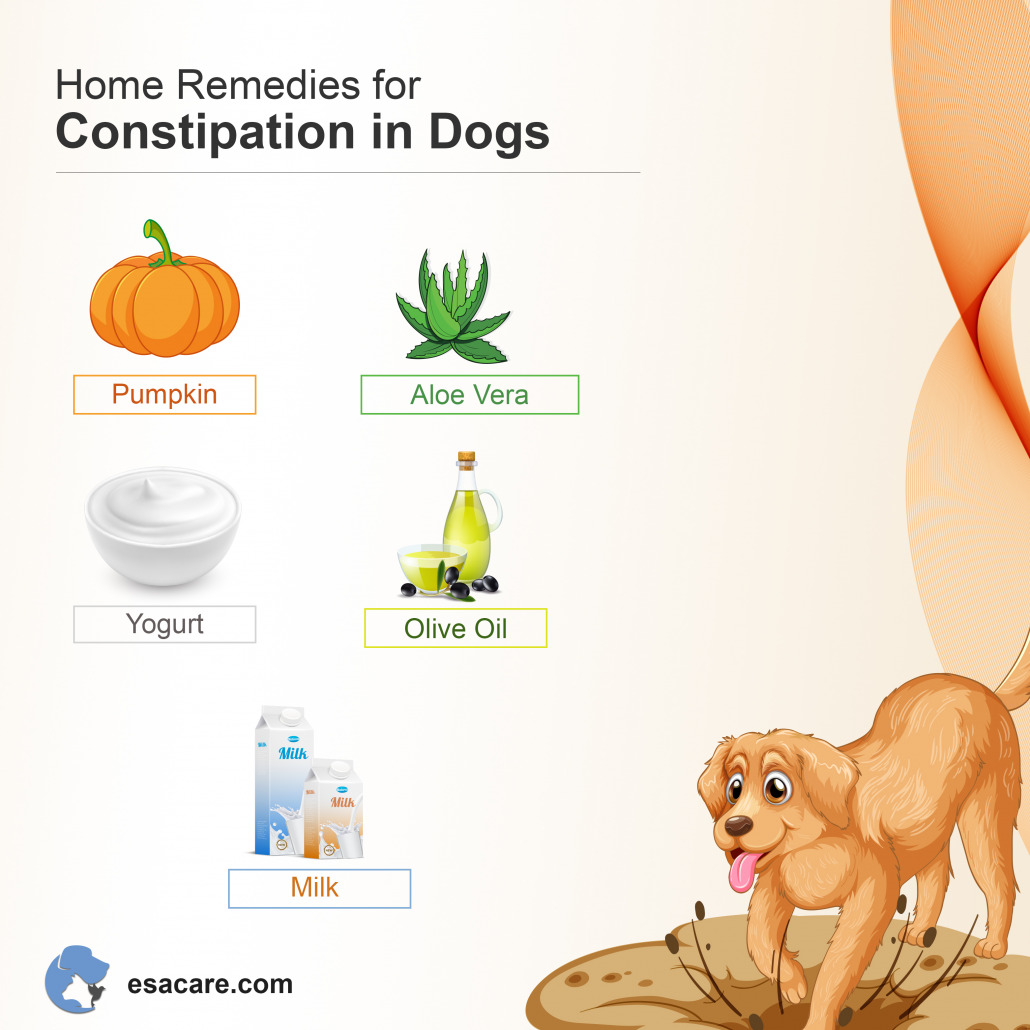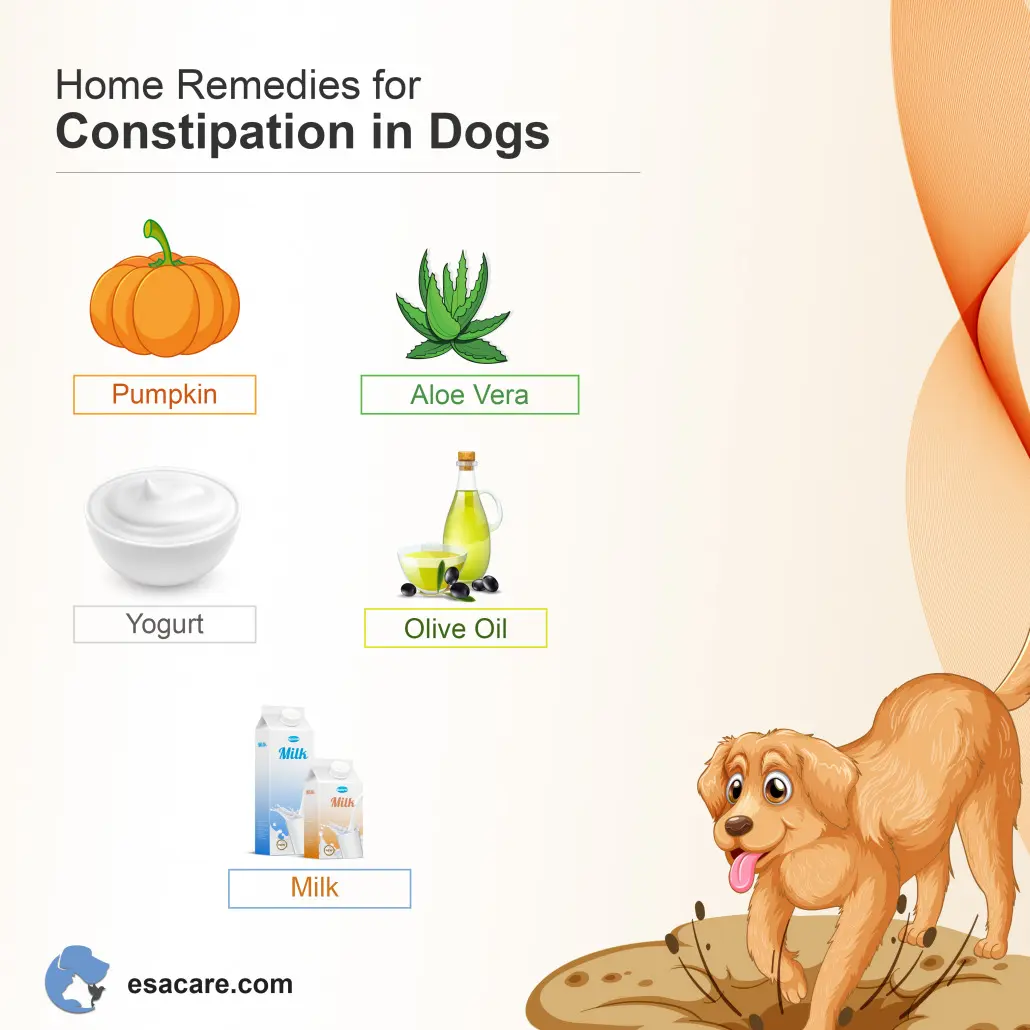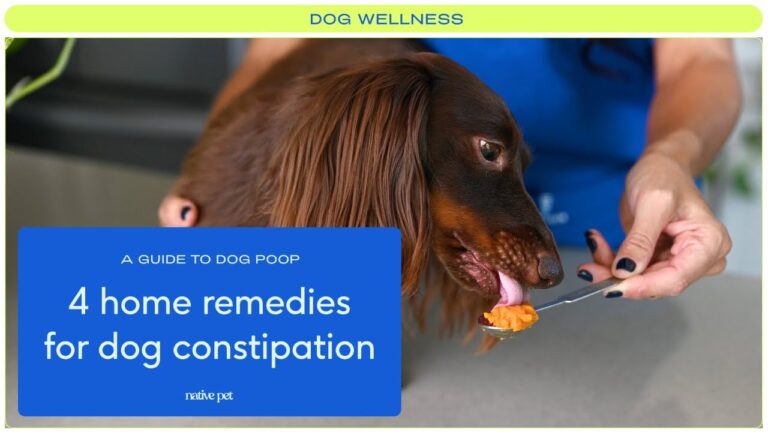For constipation home remedies for dogs, consider adding fiber or canned pumpkin to their diet. These can help alleviate constipation and improve their digestive health.
If your dog is suffering from constipation, you may be wondering what you can do at home to help them find relief. It’s important to carefully consider the options available, as some remedies may be more effective than others. We will discuss some common home remedies for dog constipation, as well as provide tips on how to prevent it from occurring in the first place.
By learning how to address constipation in your furry friend, you can ensure they remain happy, healthy, and comfortable.
Natural Remedies For Dog Constipation
Dog constipation can be a frustrating and uncomfortable experience for both you and your furry friend. While it’s always important to consult with your veterinarian for proper diagnosis and treatment, there are some natural remedies you can try at home to help relieve your dog’s constipation. By making dietary changes, increasing water intake, and ensuring regular exercise, you can help get your pup’s digestive system back on track.
Dietary Changes
Making simple dietary changes can have a big impact on your dog’s constipation. One effective method is to introduce more fiber into their diet. Fiber helps soften the stool and promotes regular bowel movements. Here are some fiber-rich foods that you can include in your dog’s meals:
- Pumpkin: Rich in fiber and water content, pumpkin can help alleviate constipation in dogs. You can feed them pureed pumpkin or add it to their meals as an ingredient.
- Brown rice: Replacing regular rice with brown rice is a great way to increase fiber intake. Make sure to cook it thoroughly and serve it in small portions to avoid any digestive upset.
- Canned green beans: These low-calorie vegetables are not only packed with fiber but also provide hydration. Add a few canned green beans to your dog’s food to help relieve constipation.
Increased Water Intake
Dehydration can worsen constipation in dogs. Encouraging your pet to drink more water is crucial for maintaining their digestive health. Here are a few tips to increase your dog’s water intake:
- Add water to their food: Mixing some water into your dog’s kibble or wet food can help increase their overall water consumption. Ensure the water is clean and fresh.
- Provide multiple water sources: Place water bowls in different areas of your home so that your dog can access water easily. This can help encourage them to drink more frequently throughout the day.
- Invest in a pet fountain: Some dogs are more enticed to drink from running water sources. Consider getting a pet fountain as it provides a continuous flow of fresh water.
Exercise
Regular exercise can stimulate your dog’s digestive system and promote healthy bowel movements. Engaging in physical activities helps keep their muscles toned and supports proper intestinal motility. Here’s how you can incorporate exercise into your dog’s routine:
- Daily walks: Taking your dog for regular walks not only benefits their overall health but also aids in relieving constipation. Aim for at least 15-30 minutes of exercise, twice a day.
- Playtime: Engage your dog in interactive play sessions to keep them active and energetic. This can include games of fetch or tug-of-war.
- Obstacle courses: Set up a mini agility course in your backyard or home to stimulate your dog’s physical and mental abilities. This can help get their bowels moving too.
While these natural remedies can provide relief for mild cases of constipation, it’s important to monitor your dog’s condition closely. If the constipation persists or worsens, reach out to your veterinarian for further guidance. By taking proactive steps and providing the necessary care, you can help keep your dog’s digestive system healthy and functioning properly.

Credit: www.pinterest.com
Herbal Remedies For Dog Constipation
Dog constipation can be a concern for many pet owners, and herbal remedies can offer a natural and gentle solution to this issue. These herbal remedies are not only effective but can also help improve your dog’s overall digestive health. When it comes to addressing dog constipation, it’s important to explore the benefits of herbal remedies. Here are some herbal remedies that can be beneficial for treating dog constipation:
Psyllium Husk
Psyllium husk, a natural source of fiber, can help promote regular bowel movements in dogs. It works by absorbing water and bulking up the stool, which aids in easier passage through the digestive tract. You can sprinkle a small amount of psyllium husk over your dog’s food to help alleviate constipation. Be sure to monitor your dog’s water intake when using psyllium husk, as it’s important for them to drink an adequate amount of water to aid in the movement of the fiber through their digestive system.
Aloe Vera
Aloe vera is known for its soothing and healing properties and can also be beneficial for treating constipation in dogs. The gel from the aloe vera plant contains enzymes that can help improve digestive function and alleviate constipation. It’s important to use a pure and safe form of aloe vera specifically designed for pets, and it’s recommended to consult with a veterinarian before administering aloe vera to your dog to ensure it is safe and appropriate for their individual health needs.
Dandelion Root
Dandelion root is a natural diuretic that can aid in promoting healthy digestion and easing constipation in dogs. It contains compounds that support liver function and help stimulate bile production, which can contribute to better overall digestive health. You can incorporate dandelion root into your dog’s diet in various forms, such as a tincture or as an ingredient in herbal teas or supplements. It’s important to consult with a veterinarian to determine the appropriate dosage and form for your dog’s specific needs.
Foods To Relieve Dog Constipation
Constipation can be uncomfortable for dogs, but some simple home remedies can provide relief. Incorporating specific foods into your dog’s diet can help alleviate constipation and improve their digestive health.
Canned Pumpkin
Canned pumpkin is a highly effective remedy for dog constipation. It is rich in fiber, which aids in promoting bowel regularity. The soluble and insoluble fiber content in pumpkin can help bulk up your dog’s stool, making it easier to pass. It’s important to use plain, unseasoned canned pumpkin without any added sugars or artificial ingredients.
Olive Oil
Olive oil is another beneficial addition to your dog’s diet when dealing with constipation. Adding a small amount of olive oil to your dog’s food can lubricate the digestive system, making it easier for waste to pass through the intestines. The natural lubrication provided by olive oil can help relieve constipation and promote regular bowel movements.
Bone Broth
Bone broth is a nourishing and hydrating solution that can aid in relieving constipation in dogs. It contains essential nutrients and minerals that support overall digestive health. The moisture from bone broth can also help keep your dog hydrated, which is important for maintaining proper bowel function. Introducing bone broth into your dog’s diet can contribute to alleviating constipation and improving their overall well-being.

Credit: esacare.com
Prevention Tips For Dog Constipation
Dog constipation can be distressing for both you and your furry companion. Fortunately, there are several ways you can help prevent constipation in dogs. By following a few simple tips, you can ensure that your dog maintains a healthy digestive system, regular bowel movements, and overall well-being.
Proper Hydration
Hydration plays a crucial role in preventing dog constipation. Ensuring that your dog has access to clean and fresh water at all times can promote healthy digestion and regular bowel movements. Dehydration can lead to hard and dry stool, making it difficult for your dog to pass. Provide your dog with plenty of water by placing multiple water bowls around your home and refilling them regularly.
Balanced Diet
A balanced diet is essential for preventing constipation in dogs. Ensure that your dog’s meals contain adequate amounts of fiber, which can help promote regular bowel movements. Foods such as pumpkin, sweet potatoes, and green leafy vegetables are excellent sources of fiber. Incorporating these foods into your dog’s diet can add bulk to their stool, making it easier to pass. Moreover, feeding your dog smaller, frequent meals throughout the day instead of one large meal can also help prevent constipation.
Regular Exercise
Regular exercise is not only great for your dog’s overall health but can also aid in preventing constipation. Physical activity stimulates the digestive system and helps regulate bowel movements. Take your dog for daily walks, engage in playful activities, or provide them with interactive toys to keep them active and encourage regular bowel movements. Remember, a sedentary lifestyle can contribute to constipation, so it’s essential to prioritize exercise for your furry friend.
When To Seek Veterinary Care
If your dog’s constipation symptoms persist or worsen despite home remedies, it may be time to seek veterinary care. Pay close attention to the following signs:
Persistent Symptoms
If your furry companion continues to experience constipation for more than 24 to 48 hours, it is important to consult with a veterinarian. Sometimes, constipation can be a symptom of an underlying health issue that requires medical attention. A professional diagnosis will help determine the appropriate course of treatment to ensure your dog’s well-being.
Bloody Stool
Another unmistakable sign that should prompt you to seek veterinary care is the presence of blood in your dog’s stool. Bloody stools can indicate a range of potential issues, from internal injuries or infections to more serious conditions such as colitis or gastrointestinal tumors. Timely veterinary intervention can help identify the underlying cause and prevent any further complications.
Lethargy
If you notice that your dog seems unusually tired or lacks energy, it could be a sign that their constipation has become more severe. Lethargy can be an indication that your dog is experiencing discomfort or pain, and immediate veterinary care is essential to address their condition and alleviate their distress. Remember to observe your dog’s overall behavior and report any significant changes to your veterinarian.
When it comes to your dog’s health, it’s crucial to pay attention to persistent symptoms, bloody stool, and lethargy. These signs could indicate more serious underlying issues that require prompt veterinary care. Always remember to consult with a professional who can provide accurate diagnosis and appropriate treatment for your beloved four-legged companion.

Credit: esacare.com
Frequently Asked Questions Of What Can I Give My Dog For Constipation Home Remedies
Can I Give My Dog Home Remedies For Constipation?
Yes, there are several safe and effective home remedies you can try to relieve your dog’s constipation. Adding fiber to their diet, such as pumpkin or psyllium husk, can help promote regular bowel movements. Ensuring they stay hydrated and getting them regular exercise can also aid in relieving constipation.
Is Olive Oil Good For Dog Constipation?
Yes, olive oil can be beneficial for dog constipation. It acts as a natural laxative, lubricating the digestive system and helping to soften the stools. Start by adding a teaspoon of olive oil to your dog’s food and gradually increase the amount if needed.
However, it’s always best to consult your vet before introducing any new remedies.
What Foods Can Help Relieve Dog Constipation?
Several foods can help relieve dog constipation. Adding canned pumpkin to their meals, which is high in fiber, can promote regular bowel movements. Other options include plain boiled sweet potatoes, steamed green beans, and plain yogurt. However, it’s important to introduce new foods gradually and consult your veterinarian for specific recommendations.
Conclusion
To sum it up, there are several safe and natural remedies that can help relieve your dog’s constipation right from the comfort of your home. From increasing fiber intake to incorporating pumpkin or probiotics in their diet, these options can effectively regulate bowel movements and promote digestive health.
Remember to consult with your veterinarian before trying any home remedies to ensure they are appropriate for your dog’s specific needs. By being attentive to your furry friend’s dietary needs and making necessary adjustments, you can help alleviate constipation and keep their digestive system healthy and happy.



